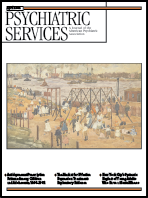Two-Year Evaluation of the Logic Model for Developing a Psycho-Oncology Service
Abstract
OBJECTIVE: The objective of this study was to test whether reorganizing a psycho-oncology service in a planned and focused manner would maximize the achievement of coherent developmental goals. METHODS: The logic model, a strategic program development tool, was used in the context of a public psychiatry fellowship to analyze and plan the organizational objectives of a psycho-oncology service. To assess the efficacy of the logic model, a two-year prospective evaluation of the model's outcome measures was performed. RESULTS: The psycho-oncology service was systematically reorganized through use of the logic model. Qualitative and quantitative data identified the degree of goal achievement. Most of the short- and medium-term clinical, educational, and research goals, as measured by outcome measures, had been realized at the two-year point. CONCLUSIONS: The logic model facilitated the effective reorganization of a psycho-oncology program by analyzing the existing service, developing pertinent goals, and then measuring goal attainment. These findings will be useful to psychiatric services interested in rational program development and service delivery, especially in small and medium hospitals with limited resources.



